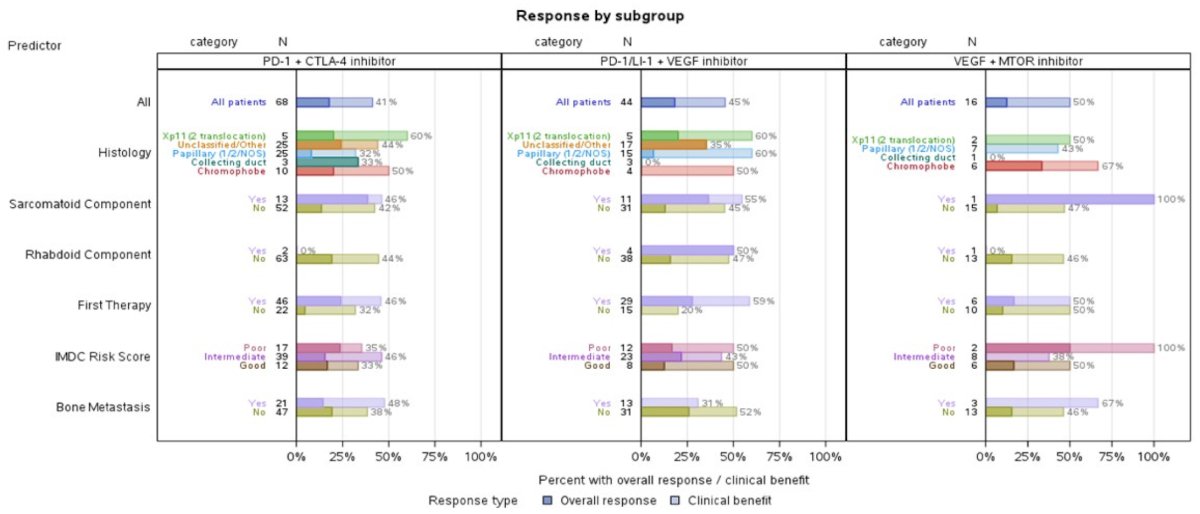(UroToday.com) The 2022 ASCO annual meeting featured a session on kidney and bladder cancer, including a presentation by Dr. Deepak Kilari discussing the ORACLE study assessing outcomes with novel combinations in non-clear cell renal cell carcinoma (RCC). Non-clear cell RCC encompasses a heterogeneous group of histologies and comprises ~25% of all RCC diagnoses. However, despite recent advances in the treatment of clear cell RCC, there is a paucity of data to guide the management of non-clear cell RCC due to the heterogeneity and rarity of these tumors. The clinical activity of combination therapies (including IO-IO, IO-VEGF, VEGF-mTOR) in subtypes of advanced non-clear cell RCC is unknown.
In this multicenter retrospective analysis, Dr. Kilari and colleagues evaluated the efficacy of combination systemic therapies in patients with non-clear cell RCC. Eligible patients included those with non-clear cell RCC as determined by local genitourinary pathology review and receipt of one of three combination regimens during any line treatment (IO-IO, IO-VEGF, mTOR-VEGF). The primary endpoint was the objective response rate (ORR) assessed by the investigator review. Secondary endpoints were progression-free survival (PFS), disease control rate (DCR), and overall survival (OS).
Among 128 included patients, the median age was 57 years, 66% were male, and 65% white. Histologies included papillary (37%), unclassified (33%), chromophobe (16%), translocation (9%), and other (5 %). Among all patients, 69% had prior nephrectomy, 80% were IMDC intermediate/poor risk, 20% had sarcomatoid and/or rhabdoid differentiation, 27% had liver metastasis, 29% had bone metastasis, and 63% received combination treatment as first line therapy. Comparison of outcomes (overall response and clinical benefit) based on histology, sarcomatoid and rhabdoid component, treatment regimen, line of treatment, IMDC risk score, and bone metastasis is shown as follows:

Median PFS was longer with IO/IO (8.5 months) and IO/VEGF (9.5 months), compared to VEGF/mTOR (3.7 months). Similar results were also seen for OS: IO/IO (24.4 months) vs IO/VEGF (18.2 months) vs VEGF/mTOR (15.4 months).
Dr. Kilari concluded this presentation by discussing the ORACLE study assessing outcomes with novel combinations in non-clear cell RCC with the following take-home messages:
- Antitumor activity was observed with novel combinations in non-clear cell RCC
- Activity was demonstrated across different tumor histologies in the first-line and later lines of therapy
- Response rates and survival with combination therapy in this dataset remain inferior to rates in clear cell RCC
- Further prospective studies are warranted
Presented by: Deepak Kilari, MD, Department of Medicine, Froedtert Cancer Center, Medical College of Wisconsin, Milwaukee, WI
Co-Authors: Aniko Szabo, Pooja Ghatalia, Tracy L Rose, Huaying Dong, Nicole Weise, Tony Z. Zhuang, Abdurahman Alloghbi, Rohit K. Jain, Ajjai Shivaram Alva, Abhishek Tripathi, Arnab Basu, Nancy B. Davis, James Brundage, Hamid Emamekhoo, Yousef Zakharia, Vadim S Koshkin, Mehmet Asim Bilen, Elisabeth I. Heath, Rana R. McKay
Affiliations: Medical College of Wisconsin, Milwaukee, WI, Fox Chase Cancer Center, Philadelphia, PA, University of North Carolina Lineberger Comprehensive Cancer Center, Chapel Hill, NC, University of California San Diego, Moores Cancer Center, La Jolla, CA, Emory University School of Medicine, Atlanta, GA, Karmanos Cancer Institute, Wayne State University, Detroit, MI, H. Lee Moffitt Cancer Center, Tampa, FL, University of Michigan Rogel Comprehensive Cancer Center, Ann Arbor, MI, Stephenson Cancer Center, University of Oklahoma Health Sciences Center, Oklahoma City, OK, University of Alabama at Birmingham, Birmingham, AL, Vanderbilt-Ingram Cancer Center, Nashville, TN, Huntsman Cancer Institute, Salt Lake City, UT, University of Wisconsin School of Medicine and Public Health, Madison, WI, University of Iowa, Iowa City, IA, University of California San Francisco, Helen Diller Family Comprehensive Cancer Center, San Francisco, CA, Department of Hematology and Medical Oncology, Emory University School of Medicine, Atlanta, GA, Karmanos Cancer Institute, Department of Oncology, Wayne State University School of Medicine, Detroit, MI, University of California San Diego Health, La Jolla, CA
Written by: Zachary Klaassen, MD, MSc – Urologic Oncologist, Assistant Professor of Urology, Georgia Cancer Center, Augusta University/Medical College of Georgia, @zklaassen_md on Twitter during the 2022 American Society of Clinical Oncology (ASCO) Annual Meeting, Chicago, IL, Fri, June 3 – Mon, June 7, 2022.


